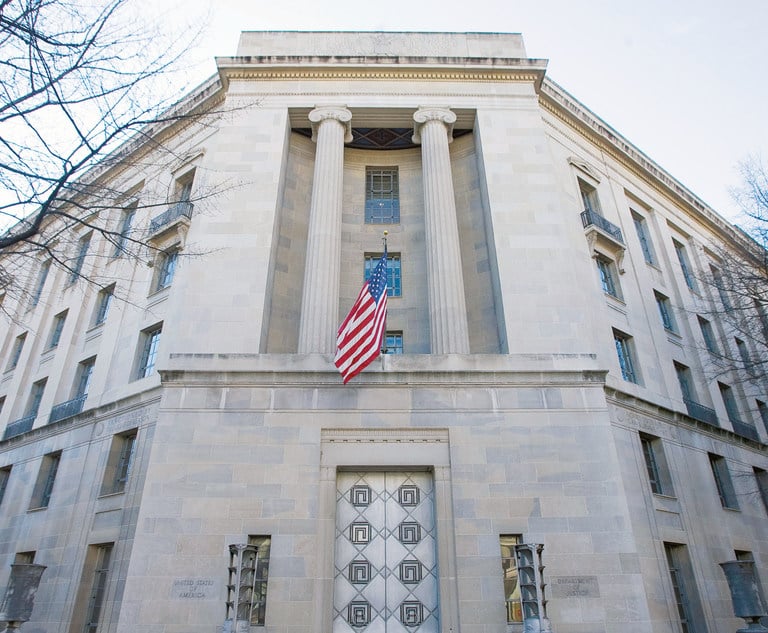Georgetown University Law Center event brings together lawyers and managers in the non-profit sector
The annual "'Representing and Managing Tax Exempt Organization" conference is now in its 28th year.
June 30, 2011 at 08:00 PM
11 minute read
I work in a non-profit law nirvana. My office is down the block and across the street from the Georgetown University Law Center. That in itself is no big deal, but the Law Center sponsors an annual conference, “Representing and Managing Tax Exempt Organizations,” and that is a big deal. Now in its 28th year, the conference has become the nation's premier event for the lawyers, accountants and managers who make the tax-exempt sector work. Each spring, several hundred of them come to Washington, D.C., for two days of closely scheduled presentations, breakout sessions and networking events, all coordinated by the Law Center's (believe it or not) Larry Center. He says the conference is the largest of the 20 national CLE programs he and his staff run each year. And, I'm pretty sure it is the largest such gathering anywhere.
The current soul of the conference is its chairman, Celia Roady, a partner at Morgan Lewis. She has been selecting the topics and the speakers since 1994, maintaining a delicate balance between the established and the emerging issues in tax-exempt law and practice. She told me she works on the program year-round and pays close attention to the evaluation forms filled out by the attendees of every session. If the topic is strong but the speaker is weak, that speaker won't be back next year. Similarly, if the topic induces ennui, it also will be set aside. One of her innovations in response to the evaluations was to create a half-day primer on select topics (e.g., UBIT, non-profit governance, charity rules) the day before the conference for newcomers to the sector or for those who want to brush up on that year's topic. If Roady is the soul, then Bruce R. Hopkins is the godfather of the conference. He started it. The well-known and well-published expert on tax-exempt organizations is now in Kansas City, Mo., but in 1983 he was a private practice lawyer in Washington, D.C. He was teaching CLE courses for the D.C. Bar and teaching as an adjunct at George Washington University's law school (where I was a student of his) when he proposed the conference to Georgetown. The school thought Hopkins' reputation would be a good draw and its own national reputation for tax law would fit nicely with a conference focused on tax-exemption issues. When asked how he came up with the idea, Hopkins simply said, “I just wanted to do it.” He said he didn't do any market research and didn't think he'd have much competition anyway.
Georgetown was correct about Hopkins' draw: Hopkins told me nobody he asked to participate turned him down. He sought out government speakers, especially those from the Treasury Department (the IRS in particular) and Capitol Hill, because attendees from outside the D.C. Beltway would find access to them particularly valuable. Private practice lawyers were just as eager to get involved. When I suggested he was the reason for the acceptance rate, Hopkins demurred and facetiously cited “my magnetic personality” as a possible reason. He said Georgetown itself was a big attraction to speakers who could then accurately claim, “I taught at Georgetown Law School.”
As a frequent attendee (and occasional speaker), I can attest to the depth of the conference's content, the extent of the support materials, the quality of its speakers and the variety of those in the audience. These days the audience is one-third lawyers and one-third accountants, and the rest are in-house managers of some kind, including lawyers. Hopkins, Roady and Center all agree this turnout is as it should be—the meeting was never intended only for lawyers. They also all agree that the trend of growth in the tax-exempt sector is likely to mean more attendees in the future. They're probably right. That's why it will be difficult finding an empty seat again next year.
Bruce D. Collins is corporate vice president and general counsel of C-SPAN, based in Washington, D.C. E-mail him at [email protected].
I work in a non-profit law nirvana. My office is down the block and across the street from the
The current soul of the conference is its chairman, Celia Roady, a partner at
Georgetown was correct about Hopkins' draw: Hopkins told me nobody he asked to participate turned him down. He sought out government speakers, especially those from the Treasury Department (the IRS in particular) and Capitol Hill, because attendees from outside the D.C. Beltway would find access to them particularly valuable. Private practice lawyers were just as eager to get involved. When I suggested he was the reason for the acceptance rate, Hopkins demurred and facetiously cited “my magnetic personality” as a possible reason. He said Georgetown itself was a big attraction to speakers who could then accurately claim, “I taught at Georgetown Law School.”
As a frequent attendee (and occasional speaker), I can attest to the depth of the conference's content, the extent of the support materials, the quality of its speakers and the variety of those in the audience. These days the audience is one-third lawyers and one-third accountants, and the rest are in-house managers of some kind, including lawyers. Hopkins, Roady and Center all agree this turnout is as it should be—the meeting was never intended only for lawyers. They also all agree that the trend of growth in the tax-exempt sector is likely to mean more attendees in the future. They're probably right. That's why it will be difficult finding an empty seat again next year.
Bruce D. Collins is corporate vice president and general counsel of C-SPAN, based in Washington, D.C. E-mail him at [email protected].
This content has been archived. It is available through our partners, LexisNexis® and Bloomberg Law.
To view this content, please continue to their sites.
Not a Lexis Subscriber?
Subscribe Now
Not a Bloomberg Law Subscriber?
Subscribe Now
NOT FOR REPRINT
© 2025 ALM Global, LLC, All Rights Reserved. Request academic re-use from www.copyright.com. All other uses, submit a request to [email protected]. For more information visit Asset & Logo Licensing.
You Might Like
View All


Inside Track: Cooley's Modest Proposal to Make Executives Safer

Trending Stories
- 1CFPB Labor Union Files Twin Lawsuits Seeking to Prevent Agency's Closure
- 2Crypto Crime Down, Hacks Up: Lawyers Warned of 2025 Security Shake-Up
- 3Atlanta Calling: National Law Firms Flock to a ‘Hotbed for Talented Lawyers’
- 4Privacy Suit Targets Education Department Over Disclosure of Student Financial Data to DOGE
- 5Colwell Law Group Founder Has Died in Skiing Accident
Who Got The Work
J. Brugh Lower of Gibbons has entered an appearance for industrial equipment supplier Devco Corporation in a pending trademark infringement lawsuit. The suit, accusing the defendant of selling knock-off Graco products, was filed Dec. 18 in New Jersey District Court by Rivkin Radler on behalf of Graco Inc. and Graco Minnesota. The case, assigned to U.S. District Judge Zahid N. Quraishi, is 3:24-cv-11294, Graco Inc. et al v. Devco Corporation.
Who Got The Work
Rebecca Maller-Stein and Kent A. Yalowitz of Arnold & Porter Kaye Scholer have entered their appearances for Hanaco Venture Capital and its executives, Lior Prosor and David Frankel, in a pending securities lawsuit. The action, filed on Dec. 24 in New York Southern District Court by Zell, Aron & Co. on behalf of Goldeneye Advisors, accuses the defendants of negligently and fraudulently managing the plaintiff's $1 million investment. The case, assigned to U.S. District Judge Vernon S. Broderick, is 1:24-cv-09918, Goldeneye Advisors, LLC v. Hanaco Venture Capital, Ltd. et al.
Who Got The Work
Attorneys from A&O Shearman has stepped in as defense counsel for Toronto-Dominion Bank and other defendants in a pending securities class action. The suit, filed Dec. 11 in New York Southern District Court by Bleichmar Fonti & Auld, accuses the defendants of concealing the bank's 'pervasive' deficiencies in regards to its compliance with the Bank Secrecy Act and the quality of its anti-money laundering controls. The case, assigned to U.S. District Judge Arun Subramanian, is 1:24-cv-09445, Gonzalez v. The Toronto-Dominion Bank et al.
Who Got The Work
Crown Castle International, a Pennsylvania company providing shared communications infrastructure, has turned to Luke D. Wolf of Gordon Rees Scully Mansukhani to fend off a pending breach-of-contract lawsuit. The court action, filed Nov. 25 in Michigan Eastern District Court by Hooper Hathaway PC on behalf of The Town Residences LLC, accuses Crown Castle of failing to transfer approximately $30,000 in utility payments from T-Mobile in breach of a roof-top lease and assignment agreement. The case, assigned to U.S. District Judge Susan K. Declercq, is 2:24-cv-13131, The Town Residences LLC v. T-Mobile US, Inc. et al.
Who Got The Work
Wilfred P. Coronato and Daniel M. Schwartz of McCarter & English have stepped in as defense counsel to Electrolux Home Products Inc. in a pending product liability lawsuit. The court action, filed Nov. 26 in New York Eastern District Court by Poulos Lopiccolo PC and Nagel Rice LLP on behalf of David Stern, alleges that the defendant's refrigerators’ drawers and shelving repeatedly break and fall apart within months after purchase. The case, assigned to U.S. District Judge Joan M. Azrack, is 2:24-cv-08204, Stern v. Electrolux Home Products, Inc.
Featured Firms
Law Offices of Gary Martin Hays & Associates, P.C.
(470) 294-1674
Law Offices of Mark E. Salomone
(857) 444-6468
Smith & Hassler
(713) 739-1250






